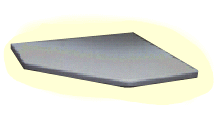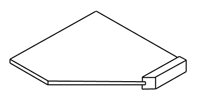

This corner shelves project is a very simple weekend project. The shelves are made out of plywood with cheap pine used as the edging to give the effect of a thicker, more solid type of wood (as well as to provide a useful lip to stop things getting knocked off too easily). The longest part of this construction by far is the painting. As such, this is a project that absolutely anyone can take on.
Tools required: Drill, jigsaw, router
Wood required (per shelf):
| Description | Qty | Width | Thickness | Length |
| Main base (plywood) | 1 | 16 1/2" | 1/2" | 16 1/2" |
| Side edging | 2 | 1" | 3/4" | 8 3/4" |
| Angled edging | 1 | 1" | 3/4" | 14" |
| Underside supports | 2 | 1 1/2" | 3/4" | 16" |
| Plug | 2 | 1/2" | 3/8" | 1/2" |

First cut the plywood into a square 16 1/2" by 16 1/2". Then, nominate two adjoining sides to be the wall sides. Measure 8 1/2" away from one wall side along one of the non-wall sides and make a mark. Repeat for along the second non-wall side. Then, draw a line between the two marks. The result should be a 45 degree angle as shown in the diagram. Cut along this line with the jigsaw (or circular saw) to provide the shape of the shelf.
Next, take the two side edging pieces and rout a groove in the inside edge (i.e. the edge that will rest against the plywood) that is 3/8" deep, 1/2" wide and 1/4" from the top side of the edging. This will allow the edging to slot into the plywood, thus making the construction stronger. Once you have routed out this groove, cut the two pieces to a length of 8 3/4" each. Note that the cut made at one end of each piece should be at a 45 degree miter, thus lining up with the profile of the plywood (see above diagram).
Next, rout out a groove in the angled edging piece (again is 3/8" deep, 1/2" wide and 1/4" from the top side of the edging). Note that this piece is longer than it actually needs to be.
Once all edging pieces have been routed, glue the two side pieces onto the plywood. Then glue the angled edging piece on, ensuring that it pushes up against the two side edging pieces. Use small brad nails to fasten the edging into place securely.
Once the glue is dry, use a saw to cut the excess wood off of the angled edging piece, thus completing the desired shape. Now, take the two small plugs of wood and glue them into the groove ends that are showing (one at each end of the angled edging piece). Again, once dry, trim off any excess wood.

Now cut out the two underside supports. The end that will fit up tight against the side edging should be cut down to 1/4" thick, tapering up rapidly (in either a curve as shown or as a straight line) to the full width of 1 1/2". Note that one side piece should be 16" long, while the other should be 15 1/4" (as it will fit butt-up against the first underside piece. Once both pieces have been cut to shape, glue and nail them to the underside of the plywood on the two sides that will touch the walls.
To fasten these shelves to the wall, drill small holes in the underside supports and use screws to attach to the wall. You should use at least two screws per support (one near each end).
Finish the shelf by heavily sanding it, removing any sharp edges and generally rounding off the whole shelf. Then paint.